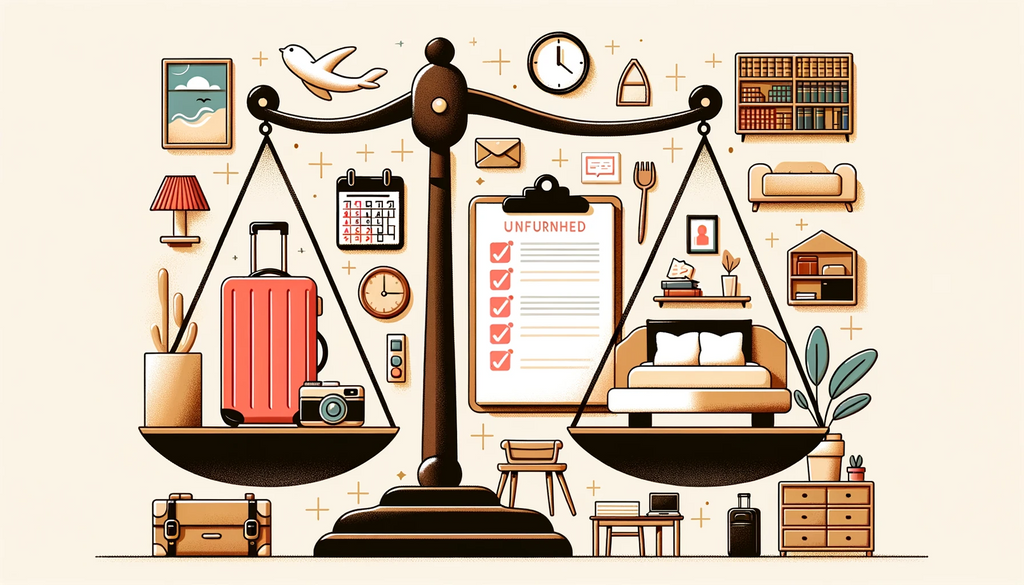When it comes to renting properties, there are two main options to consider: furnished rentals on Airbnb or long-term unfurnished rentals. The decision between the two depends on various factors such as the level of involvement in the rental business, the amount of risk one is willing to take, and the time allocation. In this blog post, we will explore the pros and cons of each option to help you make an informed decision.
Renting properties on Airbnb as short-term furnished rentals
Renting properties on Airbnb as short-term furnished rentals can be a lucrative option for property owners. With the rise of the sharing economy, Airbnb has become a popular platform for travelers looking for unique and affordable accommodations. As an Airbnb host, you can tap into this growing market and generate rental income from your property. However, it is important to note that managing an Airbnb listing requires a higher level of activity and involvement compared to traditional long-term rentals.
Tasks Involved in Managing an Airbnb Listing
When you decide to rent your property on Airbnb, you take on the role of not just a property owner but also a hospitality entrepreneur. This means you have to actively market your property, communicate with guests, handle bookings, and ensure the property is clean and well-maintained.
Marketing your property involves creating an attractive listing with high-quality photos, detailed descriptions, and competitive pricing. You need to highlight the unique features of your property and showcase it in the best possible way to attract potential guests.
Communication with guests is a crucial aspect of managing an Airbnb listing. You need to promptly respond to inquiries, provide information about the property and surrounding area, and address any concerns or questions guests may have. Good communication skills are essential to ensure a positive guest experience.
Handling bookings involves keeping track of availability, managing reservations, and coordinating check-ins and check-outs. You need to stay organized and have systems in place to efficiently handle the booking process and ensure a smooth transition for guests.
Maintaining the cleanliness and condition of the property is vital to receiving positive reviews and maintaining a good reputation on Airbnb. Regular cleaning and inspections are necessary, and you may need to hire professional cleaners or do it yourself. Additionally, it is important to address any maintenance issues promptly to ensure guests have a comfortable stay.
Risks and Challenges
While renting properties on Airbnb can generate higher rental income, it also comes with more risks compared to traditional long-term rentals. One of the main risks is dealing with difficult guests. Not all guests will be considerate or respectful of your property, and you may need to handle situations involving noise complaints, rule violations, or property damage. It is important to have clear house rules and policies in place to set expectations and protect your property.
Another risk is potential damage to the property. With short-term rentals, there is a higher turnover of guests, which increases the likelihood of accidents or mishaps. It is essential to have proper insurance coverage to protect your property from any potential damages.
Lastly, managing an Airbnb listing requires constant attention to detail and the need to constantly update and refresh the furnishings. Guests expect a certain level of comfort and amenities when staying at an Airbnb property. This means regularly inspecting and maintaining the furnishings, replacing worn-out items, and staying up-to-date with design trends and guest preferences.
Renting properties on Airbnb as short-term furnished rentals can be a profitable venture, but it requires active involvement and careful management. Hosting on Airbnb involves tasks such as marketing the property, communicating with guests, handling bookings, and ensuring the property is clean and well-maintained. However, it is important to recognize the risks and challenges that come with this business model, including dealing with difficult guests, potential property damage, and the need for constant updates and maintenance. By understanding these factors and implementing effective strategies, you can maximize your rental income and provide a positive experience for your guests.
2. Long-Term Unfurnished Rentals
If you are considering renting out your property, you may be faced with the decision of whether to offer it as a short-term furnished rental or a long-term unfurnished rental. While both options have their advantages, in this blog post, we will explore the benefits of opting for long-term unfurnished rentals.
On the other hand, opting for long-term unfurnished rentals offers a more stable and less time-intensive approach. With long-term rentals, you can secure a steady stream of income without the need for constant marketing and guest turnover. The time commitment is significantly reduced as you won’t have to constantly communicate with new guests or manage bookings. Additionally, there is generally less risk involved as long-term tenants are more likely to take care of the property and there is less turnover, reducing the chances of potential damage.
One of the key advantages of long-term unfurnished rentals is the financial stability they provide. Unlike short-term rentals, which can be subject to seasonal fluctuations and market demand, long-term rentals offer a consistent and reliable source of income. This can be especially beneficial for property owners who rely on rental income to cover their expenses or to generate additional revenue.
Furthermore, long-term rentals eliminate the need for constant marketing and advertising. With short-term rentals, property owners often have to continuously update their listings, respond to inquiries, and promote their properties through various channels. This can be time-consuming and require a significant amount of effort. In contrast, once you find a long-term tenant for your unfurnished rental, the need for constant marketing diminishes, allowing you to focus on other important aspects of property management.
The reduced time commitment associated with long-term rentals is another advantage worth considering. When renting out your property on a short-term basis, you are responsible for coordinating check-ins, checkouts, and managing bookings. This can be a time-consuming process and may require you to be available at all hours. In contrast, with long-term rentals, the rental period is typically fixed for several months or even years, reducing the need for constant communication and coordination.
In addition to these practical advantages, there are also some inherent benefits to long-term unfurnished rentals in terms of property maintenance. Long-term tenants are more likely to treat the property as their own and take care of it accordingly. They have a vested interest in maintaining the property’s condition since they will be living in it for an extended period. This can lead to fewer potential damages and maintenance issues compared to short-term rentals, where guests may not have the same level of commitment to the property.
Moreover, the turnover of long-term tenants is typically lower compared to short-term guests. This can have significant financial and logistical benefits for property owners. With short-term rentals, there is a constant need to prepare the property for new guests, clean, and restock amenities. In contrast, with long-term tenants, the turnover is minimal, reducing the time and effort required for property turnover.
When considering long-term unfurnished rentals, it is important to note that they may also require a different approach in terms of lease agreements and property management. With long-term rentals, you will likely need to draft a comprehensive lease agreement that covers the terms and conditions of the rental period. It is also crucial to conduct thorough background checks and screening processes to ensure you select trustworthy tenants who will take care of your property.
In conclusion, choosing to offer your property as a long-term unfurnished rental can provide numerous benefits in terms of stability, reduced time commitment, and decreased risk. Long-term rentals offer a consistent stream of income, eliminate the need for constant marketing, and generally involve fewer maintenance and turnover issues. However, it is important to carefully assess your particular situation and consider factors such as the location, rental market, and property management aspect before making a decision.
Conclusion
The decision between choosing furnished rentals on Airbnb and long-term unfurnished rentals ultimately relies on your personal preferences and goals. By considering your level of involvement, risk tolerance, and time allocation, you can make an informed decision that aligns with your needs.
Furnished Rentals on Airbnb
If you are looking for a more hands-on approach and the potential for higher rental income, furnished rentals on Airbnb might be the right choice for you. Here’s why:
- Flexibility: With Airbnb, you have the flexibility to rent out your property for short-term stays, allowing you to use it whenever it’s vacant. This can be beneficial if you want to have occasional access to the property for personal use.
- Higher Rental Income: Airbnb rentals generally have the potential to generate more rental income compared to long-term unfurnished rentals. By targeting vacationers and business travelers, you can charge premium rates for your furnished property.
- Personal Touch: With Airbnb, you have the opportunity to provide a unique and personalized experience for your guests. Furnishing your rental property with tasteful decor, amenities, and thoughtful touches can attract positive reviews and repeat bookings.
However, there are also factors to consider:
- Time Commitment: Renting out your property on Airbnb requires more time and effort compared to long-term rentals. You need to ensure the property is well-maintained, handle guest inquiries and bookings, and manage the turnover between guests.
- Fluctuating Demand: Airbnb rentals are dependent on tourism trends and seasonality. Depending on the location, there might be periods of high demand followed by slower seasons, affecting your rental income.
- Regulations and Risks: Some cities or neighborhoods have regulations and restrictions on short-term rentals. It’s essential to familiarize yourself with local laws and potential risks associated with Airbnb rentals, such as property damage or unfavorable guest experiences.
Long-Term Unfurnished Rentals
If you prefer a stable and less time-intensive rental business with lower risk, long-term unfurnished rentals could be the way to go. Here are the advantages:
- Stability: Long-term rentals provide a stable and predictable income stream, as tenants usually sign leases for extended periods, typically six months to a year or more. This reduces the turnover and vacancy risks associated with short-term rentals.
- Lower Time Commitment: Unlike Airbnb rentals, long-term rentals require less day-to-day involvement once you have found suitable tenants. The time spent on marketing, cleaning, and managing guest turnover is significantly reduced.
- Lower Risk: With long-term tenants, you have a higher level of certainty regarding rental income. Monthly rent payments provide a steady cash flow, and issues with disruptive guests or property damage are less likely compared to short-term rentals.
However, it’s worth considering the following aspects:
- Lower Rental Income: While long-term rentals offer stability, the rental income might be lower compared to renting on Airbnb. The absence of premium rates charged for short-term stays can result in a lower overall return on investment.
- Inability for Personal Use: With long-term rentals, you cannot use the property whenever you want, as the tenant has exclusive use of the space specified in the lease agreement. This lack of flexibility may be a drawback if you desire occasional personal use of the property.
- Market Dynamics: The demand and rental rates for long-term rentals can be influenced by market conditions and economic factors. It’s essential to research the local rental market to ensure the property’s profitability and viability.
In conclusion, the decision between furnished rentals on Airbnb and long-term unfurnished rentals depends on your specific circumstances and goals. If you are willing to put in more effort, value flexibility, and have the potential for higher rental income, Airbnb rentals might be the right choice. On the other hand, if you prefer a stable and less time-intensive rental business with lower risk, long-term unfurnished rentals provide a more hands-off approach. Evaluate your priorities and consider the pros and cons before making a decision that suits your needs.






